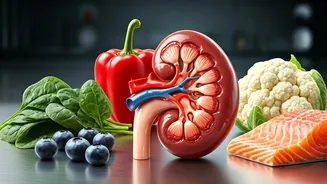Kidney's Vital Role
The kidneys are indispensable, working diligently to purify your blood by removing toxins and waste. They also take charge of managing your body's fluid
balance, regulating blood pressure, and contributing to the production of red blood cells. Because of this wide array of functions, maintaining kidney health is extremely important for sustaining overall wellness. Conditions such as chronic kidney disease can lead to serious complications, emphasizing the need for proactive measures like a well-planned diet. Understanding the value of your kidneys and how your daily dietary choices can make a difference is the initial move toward maintaining a healthy life.
Hydration, The Foundation
Water is often the most fundamental element in preserving kidney health. Drinking enough water helps the kidneys efficiently flush out waste products. Dehydration can make the kidneys work harder, increasing the risk of kidney damage. Aiming for about eight glasses of water a day helps promote optimal kidney function. Besides, you can also incorporate water-rich fruits and vegetables into your diet to boost hydration. The key is to stay consistently hydrated throughout the day to support your kidneys' vital tasks and keep your body operating smoothly.
Berries' Antioxidant Power
Berries such as blueberries, strawberries, and raspberries are nutritional powerhouses, especially for kidney health. These fruits contain a wide array of antioxidants, which combat free radicals and protect cells from damage. Antioxidants lessen inflammation and oxidative stress, both of which are major factors in kidney disease progression. Including berries in your diet offers several benefits. You can add them to your breakfast cereals, blend them into smoothies, or consume them as a refreshing snack. Their inherent properties provide an easy, delicious way to fortify your kidneys against cellular damage and encourage lasting health.
The Leafy Green Advantage
Leafy green vegetables, like spinach, kale, and Swiss chard, deliver a wealth of vitamins, minerals, and antioxidants that are advantageous for kidney health. These vegetables are low in potassium, which makes them suitable for those with kidney issues. They also contain fiber that helps in waste removal. Eating a variety of leafy greens helps improve kidney function. Incorporating these greens into your diet can be as simple as adding them to salads, steaming them, or blending them into juices. Leafy greens are great for overall health, assisting in safeguarding the kidneys from potential damage while promoting efficient waste removal.
The Garlic Benefit
Garlic is well-regarded for its capacity to improve overall health, and this extends to its advantages for kidney health. Garlic offers anti-inflammatory properties, which aid in reducing the burden on the kidneys. It can also improve blood circulation, which is key to maintaining healthy kidney function. Consuming garlic can be an easy way to boost kidney health. You can add it to many recipes, whether you prefer it raw or cooked. For those with kidney problems, garlic may be an accessible and helpful addition to their diet, contributing to overall well-being and improved organ function.
The Fish Factor
Fatty fish such as salmon, tuna, and mackerel, provide omega-3 fatty acids that have anti-inflammatory effects. This can support kidney health by reducing inflammation and guarding against kidney disease. Omega-3 fatty acids enhance kidney function and have cardiovascular benefits, promoting overall health. For people with kidney-related ailments, it's best to consume fish in moderation as part of a well-balanced diet. Considering fish like salmon or tuna as a regular part of your meals can be a tasty way to support kidney health and enhance overall cardiovascular health.


















